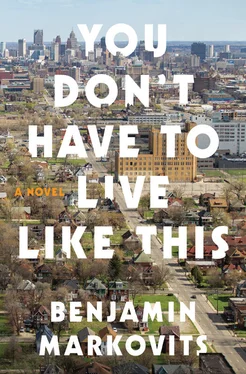I WASN’T QUITE SURE HOW to get in touch with Gloria, I mean, what excuse to make. We had left things on a purely practical footing. But I did what Mrs. Schramm said. I went down to the nearest precinct, at Beaubien Street, and got my fingerprints taken. This was a humiliating experience. While I waited, a cop brought in a group of high school girls who talked the whole time among themselves, very publicly, laughing and making fun of people. One of them looked at me and said, “What do you think he do?” and another one said, “He look like a rapist.” Then the first one said, “Yeah, he got that rapist look,” before their attention shifted to someone else.
Afterwards, I got a kind of receipt or notification, for being fingerprinted, which I sent along with the application form to Detroit Public Schools. I called up the registrar’s office at Yale and had them mail a transcript over. I signed up for a first aid class. Then I waited. The city had to pass everything on to the Department of Education. None of this gave me a reason to see Gloria.
Then one day I had the bright idea of writing a neighborhood profile about Nolan. So I knocked on his door, and he opened it with the dog at his feet and a fat kid standing behind him. They were just going out.
“What do you want?” he said.
“I want to interview you for this newsletter I write.”
“What about.”
“Gloria Lambert told me about your ninth-grade project. We could talk about that. We could also talk about your own work. We could talk about the neighborhood.”
“We’re just taking the dog for a walk. If you come along, you can clean up his shit.”
“What’s your name?” I said to the kid.
“His name is Clarence. He’s my son. If you talk to him the conversation is over.”
Nolan took the whole interview business more seriously than I expected. He made two conditions, that the piece should include a link to his website and that I should clear everything with him before it came out. I didn’t care much about these profiles so I agreed.
The kid seemed like a nice kid. He kept saying, “Dad, how come I can’t talk to this guy? You’re talking to him.”
“Because I don’t trust him,” Nolan said.
“But you’re talking to him.”
Clarence had to run a little to keep up, not all the time, but at some point on every block he had to run a few steps. Nolan was a rapid walker, he didn’t let the dog sniff around. When Buster shat against a tree he handed me a plastic bag.
“I can’t believe you’re making me clean up this shit,” I said.
“I didn’t make you anything. You just agreed to something.”
I had to walk with the bag in my hand for about ten minutes, until we came to Mackowski Playground, where there was a garbage can. Then Clarence ran off to the slides and Nolan and I sat down. He took something out of his pocket and threw it on the ground, a biscuit for the dog, which was still on the leash.
The park was busy, the weather was white and cold, and Halloween pumpkins sat out on the porches. There was a lot of construction being done on the houses overlooking the park, and you could hear hammers and drills even on a Saturday afternoon. Guys were blowing leaves into the streets and sweeping them up, but the playground was still wet with leaves, and the climbing frames looked slippery and new. Kids had their gloves and hats on. There were kids kicking a soccer ball against a baseball backstop. Clarence had one of the few black faces. On the east side was the parking lot to a nursing home and a few old men and women came out and had a look at the weather and kids and went back in.
I knew a few people there, and a woman named Rita Fuentes came over to say hello. I introduced her to Nolan. I said I wanted to write a profile about him, and she said, “He did me, too, a couple of weeks ago. My name in the papers. I sent it to everyone I know. I sent it to my son.”
She grew up in Puerto Rico but worked most of her life in Manhattan, thirty years for one family, as a child carer and then housekeeper. During this time she married and got divorced. Her own son was now a sophomore at Michigan State, and when he left home she decided to move with him. “Close but not too close,” she told me. Somehow she had managed to save a little money. For the interview I took a photo of her new apartment, which she was very proud of. The garden was full of late flowers; she grew vegetables. But she still made money, on weekends and after school, looking after other people’s children.
Nolan could be pleasant enough when he wanted to be, and after Rita left I said to him, “I guess you grew up around here. It must be changing a lot.”
“I should tell you right now I consider this occupied territory.”
“Most of this was empty land. The houses were in bad shape.”
“How long have you lived in Detroit?”
“About six months.”
“So you don’t know a damn thing. Where did you meet Gloria?” he said.
“At some party, one of these fund-raisers.”
“Why did you call her again?”
“I wanted to talk to her about teaching.”
“That doesn’t sound to me like a reason.”
“What kind of art do you do?”
“Do your homework. Don’t ask what you don’t need to ask.”
“What are you angry about? Why are you angry at me?”
“I’m not angry. This is just how I talk. People get used to it.”
In fact, I did get used to it, and over the next few weeks we saw each other several times. Clarence knocked at our door on Halloween, not with Nolan but with three other kids and an old, slow-moving woman behind them, who I took to be somebody’s grandmother. He was dressed as a football player. His helmet was mustard yellow and much too big for him — it said “Bulldogs” in cartoon letters. When I asked him about it, he told me his dad used to play football.
The next time I saw Nolan I said, “So how did you like Ferris State?”
“You’ve been doing your homework,” he said.
He invited me in for coffee one day and I met his mother. “Properly,” I said to her. “I saw you on our doorstep a couple of nights ago, with the kids.”
She had the same broad shoulders as her son; her hips looked as if they were painful to her. A bright shawl hung around her neck, and she held it against her bosom, even indoors, and only let go when I reached out to shake her hand. The room she invited me into smelled of Pine-Sol or air freshener. The curtains were half drawn, probably against the cold, it was a cold November day, and there were a lot of lights on, standing lamps and table lamps, that made circles of light on the carpet and the blanket on the sofa. The TV in the corner was one of those old TVs with a wood-grain effect and gray knobs. From the kitchen I could hear the radio on.
“You’ve got a beautiful home, Mrs. Smith.”
“Please, call me Eleanor.”
“He can call you Mrs. Smith,” Nolan said.
“Let the boy call me what he wants to.”
“What do you want to call her, boy?”
“I’m gonna give you a word of advice,” she said. “Don’t let my son bully you.”
“I think I’d like to call you Mrs. Smith.”
Nolan was an obsessive coffee maker. We could see him from the living room messing around in the kitchen, there were steam sounds, we could hear cups on counters.
“I just want mine black,” Mrs. Smith called. “I don’t want any of that fancy milk.”
“How long have you lived here?” I asked her.
“Forty-seven years. I raised two boys in this house, and now I’m raising another one. When I get the chance.”
“Do you mind people like me moving in?”
“Oh, the things I mind. .” She waved her hand away.
“Does Clarence live here full-time?”
Читать дальше












